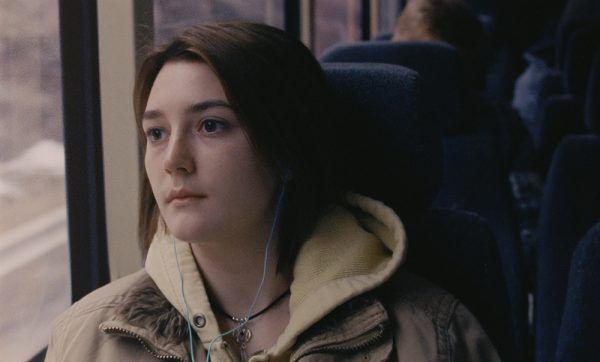Abortion is a contentious issue, and I imagine an indie film about it that doesn’t have movie stars won’t draw in anyone who hasn’t already made up their minds about being pro-choice or anti-abortion. And yet, watching Eliza Hittman’s moving drama, my concerns about the film’s efficacy of its advocacy slipped away as I was drawn further into the crushing normalcy of a casually cruel system that makes women endure an endless barrage of indignities. Watching the two young women at the center of Never Rarely Sometimes Always is devastating it just because of the incredible performances and confident direction, but because we know that the experience depicted is heartbreakingly common among women seeking an abortion.
Autumn (Sidney Flanigan) is a 17-year-old living in rural Pennsylvania who learns she has an unplanned pregnancy. Unable to tell her parents about it and with the local clinic pressuring her to give birth, Autumn confides in her cousin and friend Skylar (Talia Ryder). Together, they decide to go to New York City where Autumn will be able to get an abortion. However, as they make the trek by bus and subway and from clinic to clinic, the two teenagers are frequently confronted by their lack of money, a support system, and an onslaught of terrible men looking to prey upon them at every turn. What should be a simple procedure for a young woman who wants control of her body and her life instead becomes a harrowing odyssey fraught with roadblocks.
Because abortion is a hot-button issue (I’m a priveleged white guy, so I get to refer to abortion as an “issue” removed from myself because no one will ever pass a law telling me what I can and can’t do with my reproductive organs), some folks won’t be able to see anything more in this story. It will be an “issue” film and because it’s an indie, one that’s unlikely to change opinions. If you’re anti-abortion, you’ll feel repulsed by Autumn’s choices and think she’s a baby killer. If you’re pro-choice, you’ll be reminded to donate to Planned Parenthood. Viewing the film through the lens of advocacy narrows Never Rarely Sometimes Always because then it’s only judged by what it does or does not accomplish on a societal level, which is an impossible burden for any single movie.

Instead, Never Rarely Sometimes Always is best viewed not as a movie about changing hearts and minds as much as making it as experiential as possible. To use a recent example, the movie 1917 has a clear point of view on the nature of war, but it chooses to tell its story by attaching you to two people who could stand in for countless others. That’s a difficult needle to thread because you don’t want your lead characters to be ciphers, but you also want their story to be broad enough to encompass similar tales. Hittman manages that balance perfectly as we can’t help but empathize with the plight of Autumn and Skylar. Everything about these two teenagers feels lived-in and authentic in terms of their chemistry and their struggle without simply making them stand in for every economically disadvantaged teenager looking to terminate an unwanted pregnancy.
Both actresses are a revelation here and they demand our compassion not through big, dramatic speeches, but through little moments. When Autumn is answering a questionnaire at Planned Parenthood, Hittman keeps the camera locked in on Flanigan’s face and we’re told an entire story without ever having to hear the exact narrative. That’s not to keep Autumn’s tale vague, but because Hittman trusts us to understand what has happened while staying true to her protagonist’s stoic nature. Autumn isn’t much of a talker, but we need to understand where exactly she’s coming from, and the questionnaire scene broke me. The whole film is hard, but the questionnaire scene absolutely broke me.
Hittman doesn’t need to get flashy or swing for a big moment because what hooks you about Never Rarely Sometimes Always is the “normalcy” of it all. There’s nothing spectacular about the lack of abortion providers or the hidden costs of trying to obtain an abortion or the “clinics” that deceive young women to suit an anti-abortion agenda rather than the needs of the patient. All of this is treated as normal in America and it leads to a teenager like Autumn punching herself in the stomach in her bedroom hoping to induce a miscarriage. I don’t know who that system works for, but it certainly doesn’t work for the person who’s actually pregnant.
It would be nice to say “Reasonable people can disagree about abortion,” but Never Rarely Sometimes Alwaysshows why that’s not true. There’s a real cost to how this system is set up, and Hittman perfectly walks us through what that cost entails. If you think the only thing it costs is disagreement, then you’re probably not worried about a situation like Autumn’s. You’re free to dismiss this movie as pro-choice propaganda, but the pro-choice crowd isn’t out here setting up fake abortion clinics to dupe pregnant women. You can call Never Rarely Sometimes Alwaysjust another aborition movie, but the likely Best Picture winner isn’t treated as just another war movie. I guess that says something about which battles the world considers worthy of attention. Never Rarely Sometimes Always is about two women fighting through a cruel hell of our own devising. Don’t tell me it doesn’t matter.
Rating: A
Never Rarely Sometimes Always opens in theaters March 13th.
For more of our Sundance 2020 reviews, click the links below:
- The Assistant
- Bad Hair
- Crip Camp
- Happy Happy Joy Joy: The Ren & Stimpy Story
- Ironbark
- Miss Americana
- Promising Young Woman
- Shirley
- Spree
- Summertime
- Worth
- Zola



